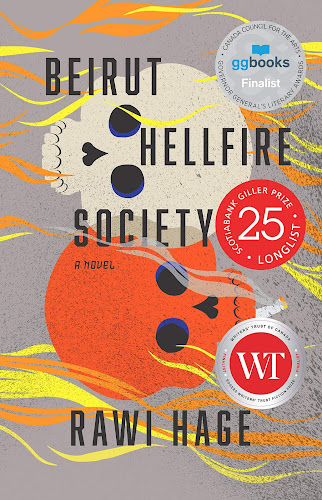#CBR12 Review #17: Beirut Hellfire Society by Rawi Hage
Beirut Hellfire Society is more a book of moments and observation than an active plot, and as such lost me at times, despite the promising premise. It focuses on an undertaker named Pavlov in 1978 Beirut, as war rages throughout the city and surrounding areas. Amidst all the carnage and daily death, Pavlov finds himself in the employment of a mysterious group known as the Hellfire Society. His job is to secretly give them their last burial and rites, as they would otherwise be denied due to their religion, sexuality, and other activities. What presents itself throughout the novel are questions about ritual and our choices in the face of death that surrounds our every day in a senseless and unyielding way.
The novel began in such a tender fashion, passing the torch from Pavlov’s father to his son, a way of respecting the lives of the dead despite their acceptance in greater society. And what a beautiful sense of community and closure this could have been. But as soon as the introduction of a character known as the Marquis (and therefore the introduction to the Hellfire Society) came into the novel, I felt the wheels spinning off track for me. Pavlov is such a quiet character himself, that he ends up bearing witness to a long speech from the Marquis and all the characters that come after him on their politics and views of the world. In some ways this is interesting, but sadly comes across in the structure of the novel as shoehorning in these ideas almost at random. It also, unfortunately, does not directly critique any of these ideas, but merely presents them. And in the form of the Marquis, this comes across as such a male fantasy of sexual liberation of the young (his students, as it were) and leading people into salacious lives. There could have been so much more to this than so quickly devolving this into a society of people who want to have wild orgy send-offs for the dead. It felt like it leaned too heavily into a caricature of itself: liberation and rebellion doesn’t need to be all about sex and violence. It almost reminded me of the Jesus du Sade character in the Preacher comics and tv show, and boy did I have fun watching his household get the crap kicked out of them (okay, so the context there was pedophilia which is not explicitly included in this novel but come on, this Marquis guy thought he was doing his students a service by seducing them).
I so wish I could get around these issues for me, and I think the observations of war and death and the sense of community are so strong, they just aren’t presented cohesively. As I mentioned, the episodic nature of the story as characters come in and out of Pavlov’s daily life leaves ideas feeling disjointed and presented as decided on the whim of the author, rather than in how it worked as an overall story and arc.
And this is all before mentioning every how woman’s depiction in this story made me feel, like each one was simply an object or, crazy, a fragile victim, or –most prominently—the embodiment of some male fantasy. These fantasies stood out the most to me in an irritating way, and ranged from a young, nubile student who just needed to let loose before smoking and having sex while firing guns, to the prostitute who just wants Pavlov to give in to her, to the shocked woman who lost her entire family that let’s Pavlov bathe her and dances naked in his house only to then walk out of his life, to the young granddaughter who is a modern Cool GirlÔ that smokes, drinks, goes out on the town in skimpy dresses and sunbathes topless on her balcony. Even the cousin he seems to detest gets a whole short chapter likening her to a hyena in heat as she has sex in a graveyard. It all left a bad taste in my mouth that sadly never felt like it truly left as I continued the novel and saw more and more depictions of women throughout.
So overall, this novel was a letdown. There is something special in the acts of Pavlov and his father, the ritual dances they do to honor the dead and give them a burial when no one else will, but this is all so bogged down by the other voices that dominate Pavlov’s story which is that of a witness to those around him. With such a strong premise that drew me in so quickly, I was sad that it all seemed to fall apart for me and end up feeling disjointed, like rambling musings about life and death and sex that a story was then written around.
[Visit the Cannonball Read main site!]




Comments
Post a Comment